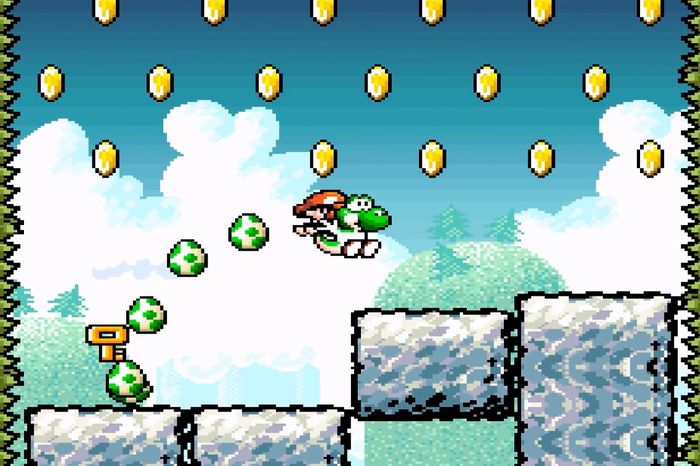
I’ve been thinking about Mario a lot lately. Nintendo just dropped Super Mario Bros. Wonder, so like everyone who owns a Switch, I’ve been obsessing over the franchise’s wild new take on the platforming genre. Since I’m currently in the throes of newborn parenthood, I haven’t had the chance to play the game yet, instead spending my waking hours between feedings enjoying Wonder vicariously through its glowing media appraisal.
As the first 2-D Super Mario platformer in over a decade, there’s been a lot of chatter about Wonder’s throwback design and whether or not it is a “worthy sequel” to the Super Nintendo classic Super Mario World, which is widely regarded as the pinnacle of the series. The actual sequel to that game, Super Mario World 2: Yoshi’s Island, has been oddly left out of the conversation. It’s been on my mind recently, though, not for how it compares to the new adventures of our favorite mustachioed plumber, but for how Mario’s time floating through the world as a helpless baby feels so true to the experience of new parenthood.
Although it bears the Super Mario World 2 subtitle, Yoshi’s Island has almost nothing to do with the first game. There’s a new crayon-art visual style, Rugrats-sounding music, and floaty platforming mechanics that are all about sniping bad guys with eggs. The main swerve, as suggested by the title, is in its player-character swap: It’s a Mario game where you can’t play as Mario. Instead, you play as Yoshi — or more accurately, several Yoshis.
Trading off with a different-colored Yoshi between stages, your job is to ferry a helpless infant Mario from world to world, protecting him from a comical array of threats. According to the opening cinematic, Yoshi’s Island is a prequel to the entire franchise — and the story is bizarrely Old Testament: The Koopas know a war is coming. Baby Mario is the Chosen One who could spell their doom. The witch Kamek wants to kidnap the diaper-clad future plumber, preventing him from growing up and becoming the Super One, but Baby Mario escapes and lands on the back of your Yoshi. It’s up to you to get him to safety and reunite him with his brother, Baby Luigi.
As goofy as that sounds, the core gameplay is actually kind of profound. Unlike practically every other platformer, it’s not really about you or your well-being at all. Yoshi doesn’t even have a health bar. It’s all about the baby. Rather than coins, in Yoshi’s Island you are tasked with collecting time on a countdown clock. You’re going to want as much time as possible, because if you get so much as grazed by an enemy, the Child starts crying, which alerts Kamek’s faceless drones. If the countdown clock reaches zero before you can pick Baby Mario back up, the Koopas promptly take him away and it’s game over. An existential one at that, as you’ve essentially failed both as a player and as a parent.
Now, I’m not about to compare Yoshi’s Island to the gripping, emotionally waylaying portrayals of fatherhood in games like The Last of Us or God of War. But for a 1995 video game about a prehistoric lizard who speaks in fart noises, the expression of early parenting is surprisingly vivid. When you have an infant, there really is no health bar. At least not for the parents. Nothing else really matters except for your child’s well-being.
My son was born in September, and it was actually some weeks before he arrived when Yoshi’s Island clicked for me. I was in the hospital, flush with sweat, having just received a call from my wife that something was wrong and she’d had to rush to the ER halfway through her prenatal yoga class. I’d spent the past ten minutes running through the mazelike halls of the hospital in search of the antepartum wing. When I arrived, I found my wife on a bed, alone in her white maternity robe, the sound of our unborn child’s heartbeat pounding like crazy on the monitor.
Questions were jamming my senses. Is she about to give birth? Is our baby okay? Is the doctor going to come in and tell us something terrible? But before I could get any answers, I noticed a “Wah-ah. Wah-ah. Wah-ah.” coming from my tote bag.
In my mad dash to get to the hospital, I’d thrown a handful of things from the apartment into my tote: protein bars, phone chargers, a musty flannel, a change of underwear, and, yes, my Nintendo Switch. Something in the bag must have pinched the power button while I was in the cab. But why did I have it with me at all? Was I planning on playing video games while my wife gave birth? Of course not. I suppose, on some subconscious, precognitive level, I couldn’t leave home without Yoshi’s Island. I was soon to be a father, and Baby Mario needed my help. So I carried him to safety.

